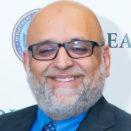Influencing institutional and governmental policy related to communication in healthcare: Evidence based approaches to communication with powerbrokers and policy makers
Research shows that most patients around the world do not get humanistic, patient-centric, and empathic care resulting in poor care with high disease burden despite the availability of very effective therapies. Members of EACH have contributed heavily to the literature that demonstrates how an absence of effective communication has contributed to this deficit. pEACH (Policy & Practice Committee of EACH) is committed to supporting the implementation of research findings into effective, evidence-based practice, as well as influencing policymakers to develop humanistic medical practice policies.
Influencing policy is challenging, requiring motivation and skill to effect change. pEACH is determined to educate our members on effective, efficient, and evidence-based communication skills, and providing ready to use resources to engage policymakers and other key health stakeholders to build a system that can serve the needs of our patients.
Great communicators are great negotiators, they resolve seemingly intractable disputes and enhance working relationships. Their negotiation/communication skills determine their effectiveness as communicators and influencers of policy. EACH members are often involved in communication and negotiation with an array of stakeholders, including healthcare system governing boards/C-suites/patients/end-users/government/health plans/insurance companies/EMR vendors/pharmaceutical companies etc.
The ability to negotiate requires a collection of interpersonal and communication skills used together to bring about a desired result. It is based on exploring underlying interests and positions to bring parties together in a constructive way. Effective negotiators use innovative thinking to create lasting value and forge strong professional relationships. They take a deep dive in to what motivates and influences differing perspectives to better understand and tackle challenges and disagreements.
This 4-hour highly interactive session provides evidence/data-based tools/interventions for identifying individual communication preferences/delivery methods/conflict resolution styles, allowing participants to discover, learn and practice the negotiation skills/tools. We will also be including case-studies, data from the literature review, needs assessment, conflict management tools that are useful in negotiation. Evidence-based interventions and tools will be discussed & practiced.
The pre-course session focuses on communication with policymakers and managers at government and level organisation levels, aiming to influence policy which promotes patient safety, quality, and satisfaction.
This course is directed towards educators, researchers, practicing practitioners/health care providers, & health professional learners at any level (students/postgraduate learners) who wish to develop skills to achieve desired outcomes while enhancing relationships with policy makers/power brokers to influence policies/practices focused on clinical communication skills. The course combines large group interactive sessions presenting evidence and concrete steps in developing specific strategy with small group sessions where participants work on their individual issues and develop plans of action.
The course will be held in English and as much as possible will accommodate participants for whom English is not their first language. We are aware that institutions in different countries will have varying resources, power structures as well as policy differences and take this into account in helping you devise strategies for your unique situation. The course will be highly interactive and participant centered and will enable individual participants to formulate concrete plans for the future to help them archive success and enhance satisfaction & happiness.
The session will be a dynamic discussion and role-play in small groups with challenges posed to attendees for group ‘problem-solving’ activities, to ensure that attendees meet the needs of our policymakers, and patients.
Course objectives
As a result of this course, participants will be able to
- Appraise and practice developing effective communication and negotiation techniques, skills and strategy while preserving and enhancing the relationship with policy makers & power broker.
- Understand the way one deals with conflict can impact negotiation.
- Explain how personal interests and positions influence negotiating.
- Identify personal strengths and opportunities for improving communication and negotiation skills.
- Recognize the value of understanding your best alternative to a negotiated agreement (BATNA).
Course facilitators have extensive experience in teaching effective negotiation and communication skills, facilitating Train the Trainers Courses for health professions educators, teaching health professional learners at all levels as well as negotiating at many level in real life.
Facilitators
 Shakaib (Shak) Rehman, MD, MACP, CSH, FAMIA, FACH, is Chair & Professor of Biomedical Informatics at the University of University of Arizona College of Medicine-Phoenix in the US. He is currently the Chair of pEACH, the policy, practice and public relations committee of EACH. He has conducted research on and taught about clinical communication and medical education for over 30 years and oversees communication skills curriculum for students, residents and practicing clinicians. He has provided faculty development related to communication skills teaching and curriculum all over the world.
Shakaib (Shak) Rehman, MD, MACP, CSH, FAMIA, FACH, is Chair & Professor of Biomedical Informatics at the University of University of Arizona College of Medicine-Phoenix in the US. He is currently the Chair of pEACH, the policy, practice and public relations committee of EACH. He has conducted research on and taught about clinical communication and medical education for over 30 years and oversees communication skills curriculum for students, residents and practicing clinicians. He has provided faculty development related to communication skills teaching and curriculum all over the world.
 Conor Giligan is Associate Professor of of Health Behaviour Science at the University of Newcastle (UON), Australia. Conor is deputy national representative for EACH and is currently serving as a member of the ICCH 2022 Scientific Committee. Conor has more than 15 years of experience as a researcher and teacher medical education, and in particular in the field of clinical communication skills. She has developed a communication skills curricula for medical students and conducts faculty development for facilitators, both at her own institution and externally.
Conor Giligan is Associate Professor of of Health Behaviour Science at the University of Newcastle (UON), Australia. Conor is deputy national representative for EACH and is currently serving as a member of the ICCH 2022 Scientific Committee. Conor has more than 15 years of experience as a researcher and teacher medical education, and in particular in the field of clinical communication skills. She has developed a communication skills curricula for medical students and conducts faculty development for facilitators, both at her own institution and externally.
 Demi Krystallidou is a research fellow at the Centre for Translation Studies at the University of Surrey, UK. Her expertise is in multilingual healthcare communication which she studies by means of interdisciplinary research methodologies. She qualified as a conference interpreter (Heriot Watt 2006) and holds a PhD in Translation Studies (Ghent University 2013). She has published extensively on linguistically discordant and interpreter-mediated healthcare communication and her work has appeared in high impact journals in the fields of healthcare communication, interpreting, educational research and health services research. She is currently involved in several UK and EU research grants where she leads on implementation and evaluation. She serves as reviewer for UK research councils and leading journals in healthcare communication. She is an editorial board member of BMC Health Services Research and the deputy Chair of pEACH.
Demi Krystallidou is a research fellow at the Centre for Translation Studies at the University of Surrey, UK. Her expertise is in multilingual healthcare communication which she studies by means of interdisciplinary research methodologies. She qualified as a conference interpreter (Heriot Watt 2006) and holds a PhD in Translation Studies (Ghent University 2013). She has published extensively on linguistically discordant and interpreter-mediated healthcare communication and her work has appeared in high impact journals in the fields of healthcare communication, interpreting, educational research and health services research. She is currently involved in several UK and EU research grants where she leads on implementation and evaluation. She serves as reviewer for UK research councils and leading journals in healthcare communication. She is an editorial board member of BMC Health Services Research and the deputy Chair of pEACH.
Fees
Member £180
Non member £210
Student £130
Registration
This course takes place prior to ICCH 2022, in Glasgow, Scotland.
